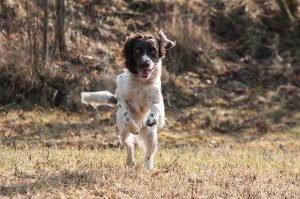 Active dogs like working, sporting, and hunting dogs, burn a serious amount of energy – up to four times more than that of your average dog. To counteract and support this extreme athleticism, they require a suitable high-energy feed.
Active dogs like working, sporting, and hunting dogs, burn a serious amount of energy – up to four times more than that of your average dog. To counteract and support this extreme athleticism, they require a suitable high-energy feed.
Joint health is also crucial to your dog’s longevity, be it farming, policing, sporting and so on. Your active dog is invaluable to your team, and a carefully thought out diet will mean a long, happy, healthy and action-packed life.
When deciding on your dog’s diet, ensure it covers the following;
- The food should be doggy-delicious.
- The feed should provide your dog with enough energy to work hard, play hard and thrive.
- Your dog’s food should support a healthy digestive system, help build lean muscle and aid in muscle recovery after strenuous athletic activity.
- If your dog is extremely active, his feed may need additional nutrients to support joint health and mobility.
- Your working dog is an athlete; his food will need fortifying with essential vitamins and minerals.
When to opt for high energy food
If your working or sporting dog is exceptionally active, chances are he’ll need a high-energy feed to match his energy outputs. Fat is your dog’s primary source of energy. Specialised high energy foods – alongside additional minerals, vitamins and highly digestible ingredients – possess a high fat content to meet this requirement.
Keeping weight on your sports dog
Highly active dogs are prone to weight loss. The correct feed will nourish your dog, help maintain a healthy weight, and provide all the energy he needs to perform. However, if your dog seems to be losing weight without cause, speak directly to your vet; they may need to conduct a complete physical exam to rule out any underlying health issues.
Joint health
For working and highly active dogs, joint ailments can be a real problem. Dogs that were once performing athletic movements and covering vast distances can begin to feel pain and discomfort – leading to slowing down and disengaging from the sports they once loved. When pain is obvious, and you see a decline in your dog, veterinary advice is required ASAP.



